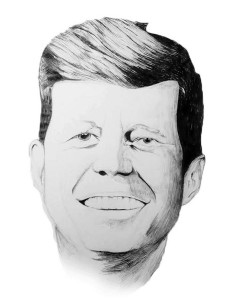Kennedy serves as a role model
Tomorrow is the 50th anniversary of the assassination of President John Fitzgerald Kennedy, an event that shocked the world and brought the nation to its knees. For my parents’ generation, Kennedy was a hero. And at 43, he is still the youngest person to be elected to the United States presidency.
My parents can remember every detail of the day they heard about the assassination on Nov. 22, 1963, just like how many people of my generation can remember where we were on Sep. 11, 2001.
Tragedy has a curious way of bringing people together. It brought them together on that Friday in 1963, and it will bring the world together tomorrow to reflect on Kennedy’s legacy and the lessons he taught by example. The U.S. Congress has made it nearly 35 days without a major political catastrophe, which many might consider an accomplishment. As the nation gathers to mourn Kennedy’s all-too-short presidency, we should remember that it was deeply representative of the characteristics of leaders for the people — something our current government could use a lesson in.
Kennedy inspired the nation
“We choose to go to the moon in this decade and do the other things, not because they are easy, but because they are hard,” Kennedy told students at Rice University in 1962. Though Kennedy would never live to see Neil Armstrong take the “one giant leap for mankind” that the president inspired years earlier, his words challenged the nation to never give up the fight for progress and to never be satisfied with the status quo. Fifty years later, with a government space program on the chopping block, and with the shuttle fleet that Kennedy’s words inspired now resting in science museums around the country, this nation could use some inspiration.
Kennedy looked out for the little people
“We can say with some assurance that, although children may be the victims of fate, they will not be the victims of our neglect,” Kennedy stated when he signed mental health legislation in 1963. Though government assistance is a central political question that divides Congress year after year, Kennedy reminded us to never lose sight of our most basic moral responsibility as humans: to look out for each other, and to look out for those that are less fortunate. Now, as Congress decides how to restore the nearly $5 billion that was cut from the Supplemental Nutrition Assistance Program, also known as food stamps, the less fortunate should not be far from their minds.
Kennedy took responsibility for his actions
When it became clear that the Bay of Pigs invasion had been mishandled by the United States and the Central Intelligence Agency, Kennedy could have remained silent and allowed a furious bipartisan debate to overwhelm Congress over who was to blame for the invasion. Instead, Kennedy stood before the nation and took “sole responsibility” for the failed attempt at a coup. After accepting responsibility, a settlement was arranged with the Cuban government for the safe return of the fighters taken prisoner during the invasion.
These days, the public watches as their elected officials struggle to avoid taking blame at all costs for embassy security in Benghazi, Libya, allegations that the Internal Revenue Service unfairly targets conservative groups and the problems with the implementation of the Affordable Care Act. What most of people don’t realize — and what Kennedy did — is that moving forward begins with accepting responsibility. Given that no one in the modern political era is willing to attempt this on any range of issues, it should come as no surprise that we aren’t moving forward on those issues.
Three days before Kennedy was assassinated, the nation celebrated the 100th anniversary of one of the greatest speeches in U.S. history, delivered by President Abraham Lincoln at Gettysburg, Pa. Lincoln spoke of the necessity of preserving the union, and preserving government “of the people, by the people, for the people.” Today, we face a new threat to that government — and it is because our leaders spend more time asking what their country can do for them, instead of asking what they can do for their country.
Sound familiar?
Nathaniel Haas is a sophomore majoring in economics and political science. His column “A House Divided” runs Thursdays.
Follow Nathaniel on Twitter @Haas4Prez2036

